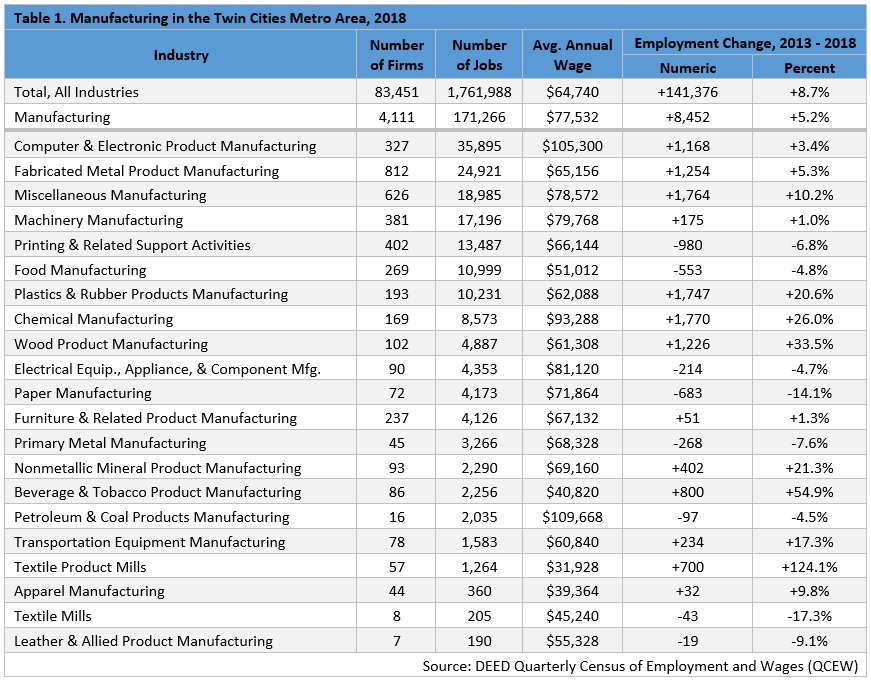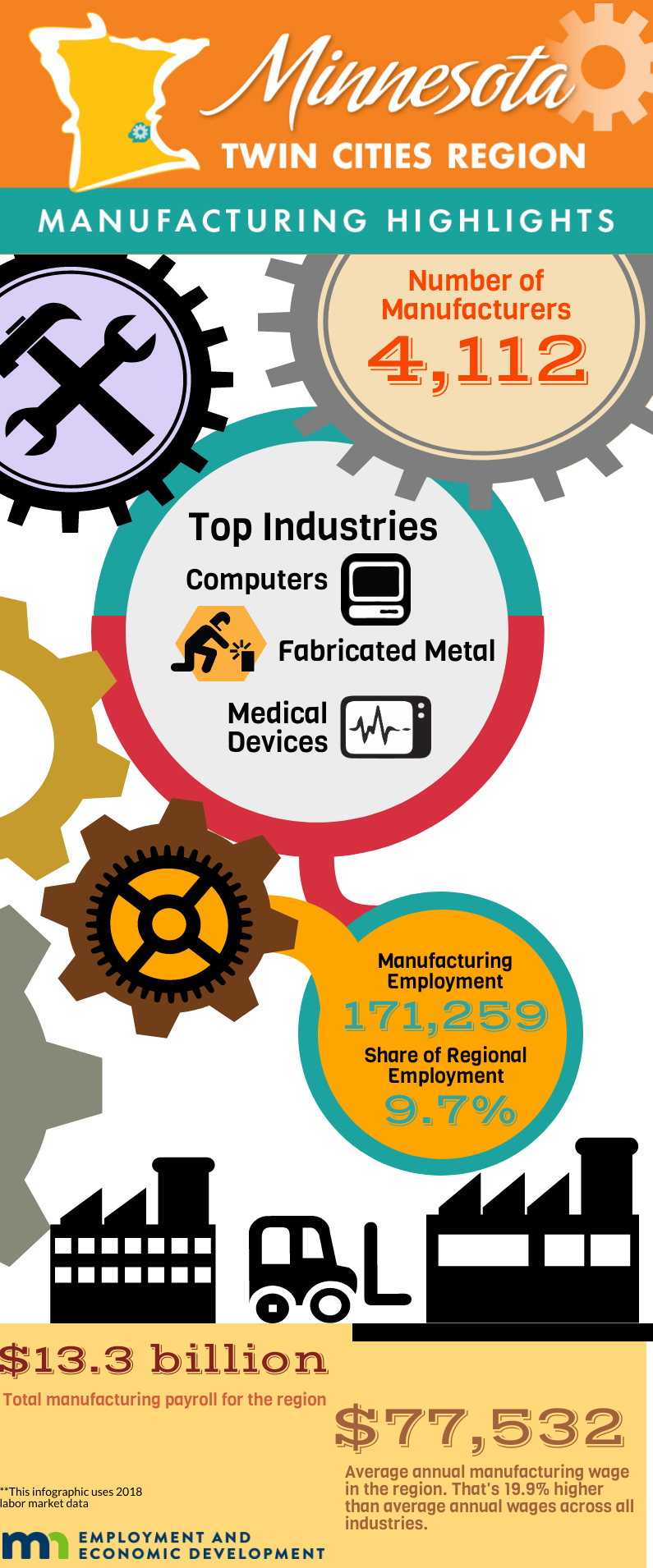 The Minneapolis-St. Paul metropolitan area is a national leader in finance, advanced manufacturing, agriculture and retailing.
The Minneapolis-St. Paul metropolitan area is a national leader in finance, advanced manufacturing, agriculture and retailing.
Medical devices, electronics and processed foods are strong suits recognized globally.
Want the freshest data delivered by email? Subscribe to our regional newsletters.
9/13/2019 2:00:00 PM
Tim O'Neill
According to the North American Industry Classification System (NAICS), the manufacturing sector comprises establishments engaged in the “mechanical, physical, or chemical transformation of materials, substances, or components into new products.” With so many different materials, substances, and components, Manufacturing is broken down into 21 distinct subsectors. These sectors range from Food Manufacturing to Fabricated Metal Product Manufacturing to Printing and Related Support Activities. In fact, Manufacturing has the most subsectors of any major industry sector (Retail Trade has the second most subsectors with 12). These 21 manufacturing subsectors in the Metro Area are broken down in Table 1.

With nearly 36,000 jobs, Computer and Electronic Product Manufacturing is the Metro Area’s top-employing manufacturing subsector. In fact, where the Metro Area accounts for 53.2 percent of Minnesota’s total manufacturing employment, it accounts for 79.1 percent of the state’s Computer and Electronic Product Manufacturing employment. Establishments in this subsector manufacture computers, communications equipment, audio and video equipment, semiconductors, navigational and control instrumentation, and optical and magnetic media, among other specialized electronic products. With such advanced manufacturing processes and products, the average annual wage in this subsector is high, being $105,300 in 2018. This was second only to Petroleum and Coal Products Manufacturing out of the 21 manufacturing subsectors. Occupations highly concentrated within this subsector include electrical, electronic, and electromechanical assemblers; software developers of systems software; assemblers and fabricators; software developers of applications; and industrial engineers.
 With nearly 25,000 jobs, Fabricated Metal Product Manufacturing accounts for about one-in-seven manufacturing jobs. When one thinks of general manufacturing employment, they’re probably thinking of jobs within Fabricated Metal Product Manufacturing. Establishments in this subsector, according to the NAICS system, “transform metal into intermediate or end products…or treat metals and metal formed products fabricated elsewhere.” As such, common processes within this subsector include forging, stamping, bending, forming, machining, welding, and assembling. If looking to find work in this subsector, you may try becoming a welder; assembler and fabricator; cutting, punching, and press machine operator; CNC operator; or inspector, tester, sorter, sampler, and weigher.
With nearly 25,000 jobs, Fabricated Metal Product Manufacturing accounts for about one-in-seven manufacturing jobs. When one thinks of general manufacturing employment, they’re probably thinking of jobs within Fabricated Metal Product Manufacturing. Establishments in this subsector, according to the NAICS system, “transform metal into intermediate or end products…or treat metals and metal formed products fabricated elsewhere.” As such, common processes within this subsector include forging, stamping, bending, forming, machining, welding, and assembling. If looking to find work in this subsector, you may try becoming a welder; assembler and fabricator; cutting, punching, and press machine operator; CNC operator; or inspector, tester, sorter, sampler, and weigher.
Miscellaneous Manufacturing, with about 19,000 jobs, makes up the Metro Area’s third largest-employing manufacturing subsector. Machinery Manufacturing, with just about 17,200 jobs, isn’t far behind. Each of these subsectors accounts for approximately one-in-ten of the region’s total manufacturing jobs. Both subsectors also happen to have average annual wages approaching $80,000. Miscellaneous Manufacturing is a mix of both Medical Equipment and Supplies Manufacturing and Other Miscellaneous Manufacturing (which includes jewelry, sporting and athletic goods, toys and games, office supplies, signs, musical instruments, and burial caskets). In the Metro Area, more than three-quarters of its Miscellaneous Manufacturing employment is within Medical Equipment and Supplies Manufacturing. Machinery Manufacturing, for its part, involves multiple metal forming processes and complex assembly operations to produce everything from flour milling machinery to ventilation fans to metal cutting machines.
Occupations within Miscellaneous Manufacturing and Machinery Manufacturing may be similar in name to those occupations found within Computer and Electronic Product Manufacturing, Fabricated Metal Product Manufacturing, and any of the other 17 manufacturing subsectors. Many of these subsectors will call for welders, CNC operators, inspectors and testers, machinists, and assemblers and fabricators. Additionally, these subsectors employ supervisors, sales representatives, general and operations managers, shipping and receiving clerks, and other various occupations not typically associated with manufacturing.
Of course, the skills, knowledge, and experience required will differ from one manufacturing job to the next, from one company to the next, and from one subsector to the next. For example, an Electrical Controls Engineer at one manufacturing company may require a bachelor’s degree in electrical engineering, along with CAD experience and proficiency in Microsoft Office. Meanwhile, a TIG Welder at another company may require a high school diploma along with five to eight years of experience in precision welding. Other opportunities to enter manufacturing may come about from career and technical education, apprenticeships, or even on-the-job training. However, nearly every occupation in manufacturing will require essential skills such as excellent time management, attention to detail, good oral and written communication, and the ability to work both in team settings and independently.
Whether it’s an Electrical Controls Engineer in Computer and Electronic Products Manufacturing, or a TIG Welder in Fabricated Metal Products Manufacturing, there are plenty of opportunities for working in manufacturing in the Twin Cities Metro Area. According to DEED’s Job Vacancy Survey, manufacturing employers recently reported about 6,000 job vacancies. This was the second-most vacancies ever reported since the survey began in 2001.
In such a large-employing, diverse, and ever-evolving industry sector, it will be eye-opening to see how manufacturing continues to shape the Twin Cities Metro Area. Whether you’re interested in pursuing a certificate or degree in a specific production field, finding a career in manufacturing, or learning more about this industry in the Metro Area and across Minnesota, check out the following resources:
Contact Tim O’Neill at 651-259-7401.